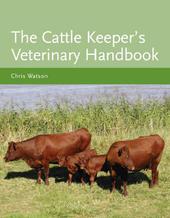
|
The Cattle Keeper's Veterinary Handbook
Hardback
Main Details
| Title |
The Cattle Keeper's Veterinary Handbook
|
| Authors and Contributors |
By (author) Chris Watson
|
| Physical Properties |
| Format:Hardback | | Pages:192 | | Dimensions(mm): Height 246,Width 189 |
|
| Category/Genre | Animal husbandry |
|---|
| ISBN/Barcode |
9781847971067
|
| Classifications | Dewey:636.2089 |
|---|
| Audience | |
|---|
| Illustrations |
Halftones, color; Illustrations, unspecified
|
|
Publishing Details |
| Publisher |
The Crowood Press Ltd
|
| Imprint |
The Crowood Press Ltd
|
| Publication Date |
30 June 2009 |
| Publication Country |
United Kingdom
|
Description
TThis invaluable book is aimed at anyone involved in the day-to-day practical healthcare of cattle, from those supplying professional services to a farm, to stockpersons in charge of the animals. Disease is an inevitable everyday risk for all those who keep cattle and very often it has a huge impact on the animal's welfare, as well as its productivity. It is also a fact of life that many of these diseases are due to, or made worse by, the demands made on the modern bovine to perform at high levels of production. All the common cattle diseases are covered in detail in this comprehensive book. The opening chapter deals with the skills needed, and the procedures to adopt, when a making a basic examination of an animal. In subsequent chapters, the author places considerable emphasis on the various physiological systems because these are the starting point for describing the disease processes. It is a reasonable first step, when presented with a sick animal, to make a basic decision about which system is affected for example, the gut or the respiratory system, based on the main presenting signs, such as diarrhorea or coughing. Each physiological system is then dealt with in the next context of how it responds to disease and what natural defences are present. The basic response of any system to illness results in the clinical signs exhibited by the animal, and the natural defences are a vital part of the system because they affect the incidence and severity of the disease. The clinical signs help the cattle keeper to recognize the specific disease process, and understanding the basic defence system involved enables practical measures to be used to help with both treatment and, more importantly, prevention of disease . AUTHOR: Chris Watson MA, VetMB, MRCVS is a veterinary surgeon who has spent all of his working life in cattle practice. This has mostly involved working with dairy cows and has taken him through many of the intensive dairy areas in England: Herefordshire, Shropshire, Cheshire, Dorset and finally Gloucester, where he has worked since 1979 in the Wood Veterinary Group. This career has involved a huge amount of practical experience in dealing with cattle production and diseases, and he has written and demonstrated extensively on this subject. Chris continues to be actively involved in everyday cattle practice and the photographs and information contained in this book are all drawn from his personal veterinary experiences. He has been a long-serving member of the British Cattle Veterinary Association, of which he was secretary for eight years and president in 1996 during the World Buiatrics Congress in Edinburgh. Chris continues to spend a considerable amount of time writing and teaching practical cattle medicine, as well as developing practical health initiatives for dairy herds. ILLUSTRATIONS: 186 colour photographs
Author Biography
Chris Watson MA VetMB MRCVS is a veterinary surgeon who has spent all of his working life in cattle practice. This has mostly involved working with dairy cows and has taken him through many of the intensive dairy areas of England including Gloucester where he has worked since 1979 in the Wood Veterinary Group. He has been a long-serving member of the British Cattle Veterinary Association. Chris continues to spend a considerable amount of time writing and teaching practical cattle medicine, as well as developing practical health initiatives for dairy herds. Resident - Gloucester
|